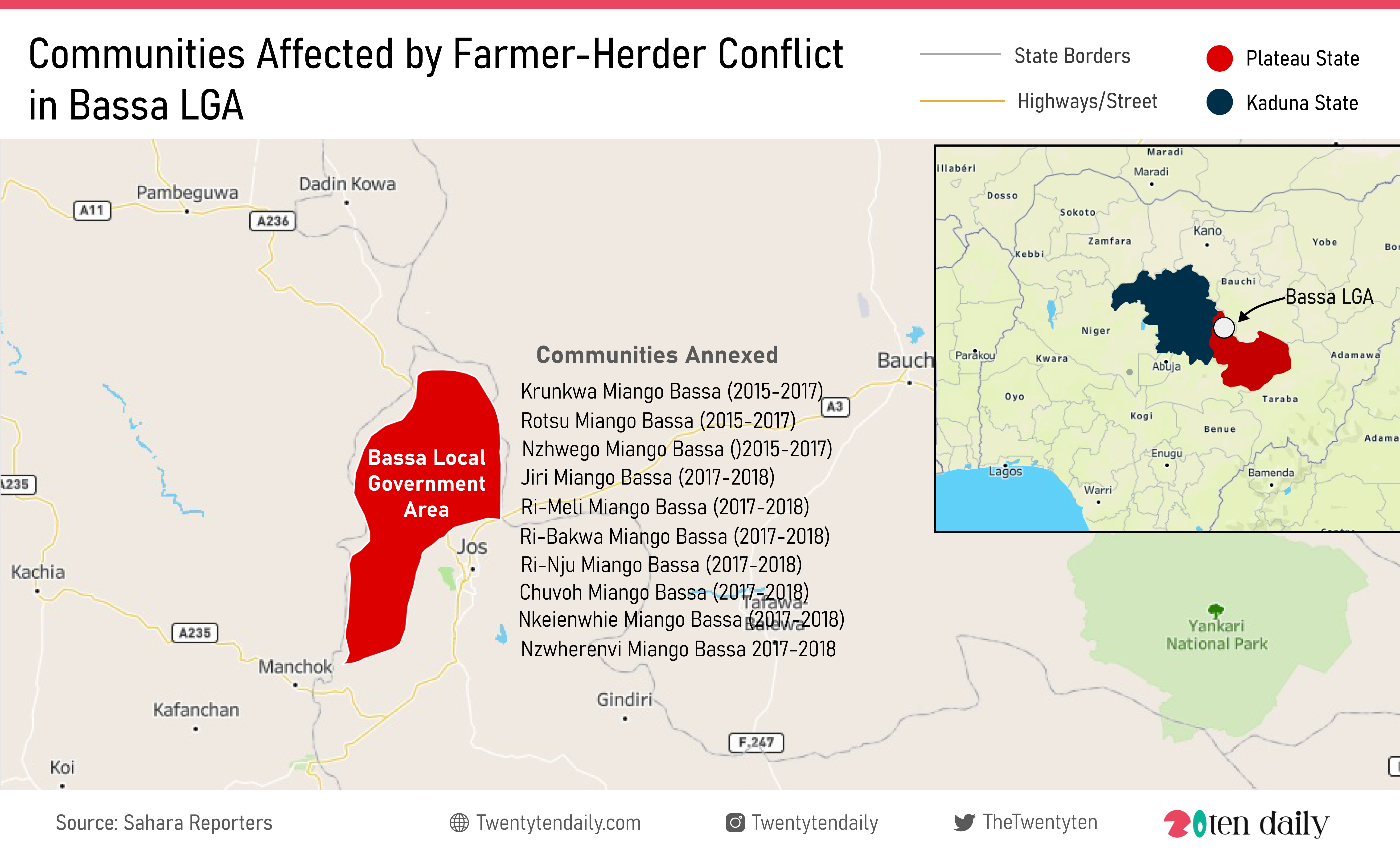Plateau State: Inside Recent Farmer-Herder Conflicts In Bassa LGA
Since 1999, Plateau State, home to about 40 ethnic groups, has endured horrific conflict centred on land disputes between farmers and nomadic herders, leading to the documented death of over 100,000 people and the displacement of at least 300,000 people.
The clashes, majorly between Muslim Fulani herders and Christian farmers from the Berom and Irigwe ethnic groups, are often painted as ethnoreligious. But experts say urbanization causing scarcity of pastoral lands is the major cause of the tension between the two groups, irrespective of their faith.
The majority of natives from the Irigwe and Berom ethnic groups grow acha (a grain known as “hungry rice”) and millet while the chief cash crops are yams, sorghum, corn, potatoes, cowpeas and rice.
The Fulani, meanwhile, are nomadic pastoralists who travel in search of greener pastures for their livestock. The movement of cattle in the farmlands of farmers, destroying crops in their wake, is the major dispute between the two groups.
Since the beginning of the year, onslaughts by herders have become more frequent and presumably strategically targetted at populated Local Government Areas that have hosted Fulani settlers for over a hundred years.
The Bassa Local Government Area for one has endured at least six violent attacks by herders, pushing announced casualties to over 20 in the first three months of 2022, but locals claim the figure is grossly inaccurate.
Unending Conflict In Bassa
Bassa is a Local Government Area in the north of Plateau State, bordering Kaduna and Bauchi States. The region hosts more non-indigenes due to the herder’s crisis that can be traced back to 2001, and here is why.
According to different accounts shared at community-organized peace forums, Fulani militia illegally annexe lands belonging to natives after an attack. A large influx of herders then occupies the annexed lands termed “conquered lands”, leaving no lands, farms or properties for the indigenous owners.
In 2021, a socio-political group, Southern and Middle Belt Alliance (SAMBA) demanded the immediate eviction of Fulanis from 102 communities in four LGAs, as well as a government order restricting the militia from further invasion of communities in the state. Fulani herders have currently annexed 10 communities in Bassa LGA, according to a list by the group.

These communities annexed by the Fulani strategically surround the non-annexed parts, allowing for easy access to lands still occupied by indigenes. However, a majority of communities in the area are still occupied by natives or sympathetic settlers who often take up arms against the Fulani community, attacking cattle and killing herders.
In March 2022, the state chairman of the Gan Allah Cattle Breeders Association of Nigeria, Abdullahi Shehu, told Daily Trust that over 100 hundred cattle were killed in Bassa communities by armed attackers.
Casualty Statistics On Farmer-Herder’s Conflict
A Nigerian government investigative committee found that between September 2001 and May 2004, recurring attacks by herders and reprisal attacks by farmers resulted in the deaths of more than 53,000 people.
In June 2018, over 200 people were killed and 50 houses were burnt in clashes between farmers and Fulani cattle herders in Plateau State, with a majority from the Bassa LGA.
Recent attacks from January 2022 to April 2022 have led to the displacement of over 1,000 people and the death of up to 28 people. Note that locals insist casualties have not been accurately reported.
The Irigwe community has also reported the loss of about N500million following the destruction of their farmlands, crops by suspected herders since February 2022.
So far, the government has organized conflict resolution meetings and special task force groups like the Operation Safe Haven (OpSH) to aid in restoration of peace, but recurring bouts of attack threatens every progress of the groups. It would seem more would need to be done to save the men, women, children, crops and cattle of the Bassa Local Government Area of Plateau.


